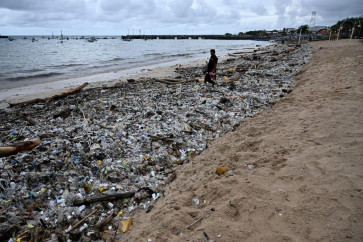MRT 'priority pin' sees general welcome
Passengers of Indonesia’s first MRT service have welcomed the issuance of a new pin that identifies priority passengers on board, like senior citizens, pregnant women and people with disabilities
Change text size
Gift Premium Articles
to Anyone

P
assengers of Indonesia’s first MRT service have welcomed the issuance of a new pin that identifies priority passengers on board, like senior citizens, pregnant women and people with disabilities.
City-owned operator PT MRT Jakarta is providing the pins for free to priority passengers to help them access the service's facilities, such as elevators.
MRT Jakarta corporate secretary Muhammad Kamaludin said that the pin also permitted priority passengers to pass through the wider turnstiles and to sit in the prioritized seats on the trains.
Hafiz, 32, who traveled with his 64-year-old father Mad Soleh from Tangerang, Banten, to Lebak Bulus, South Jakarta, on Thursday, welcomed the policy, saying that his father would benefit from the new pin, even though he rarely took public transport.
“If my father used the MRT more often, I’m sure he would love to wear the pin,” Hafiz told The Jakarta Post while pushing his wheelchaired father to board a train.
“Whenever the train is crowded, elderly people like my father struggle to find a seat, let alone priority seats. With the pin, I hope they can access the seats as well as other facilities more easily,” he said.
However, the pin’s issuance is not without its critics, as some passengers believe that it does not solve the fundamental issues of the onboard environment.
Jessica, a 24-year-old employee and mother, said that she would not wear the pin, as it would not have a significant impact on the behavior of other passengers toward priority passengers.
Based on her experience riding the MRT during her pregnancy, other passengers sat in priority seats even if a pregnant woman was standing nearby. She also noted that women traveling with their children were particularly disadvantaged, with other passengers taking up more space than they needed.
“The MRT [Jakarta] should instead educate passengers about the do’s and don’ts on the train, such as giving their seats to people who clearly need the seat more, instead of simply creating the pin,” said Jessica.
She also raised concerns over possible misuse of the priority pins and potentially causing trust issues between priority and regular passengers.
“The MRT should also be more specific about who deserves [to wear] the pin and the rules surrounding it, like what happens with the pin for pregnant women after they have given birth,” she added.
To anticipate the potential misuse and other issues related to the priority pin, MRT Jakarta intends to thoroughly screen passengers on applying for the pin.
Station officer Rika said that passengers needed to contact the MRT Jakarta call center to apply for the pin, and use identification like their contact number, specify the priority passenger category and at which station they would pick up the pin.
Once they had applied, Rika said that MRT Jakarta would verify their eligibility through a checkup at a designated station.
“Applicants will have to visit our First Aid room for a medical checkup. There, we will see more clearly whether they are qualified to wear the pin,” Rika said.
Pregnant women would need to provide either a doctor's letter or the results of their latest pregnancy test.
“After passing the selection process, the applicants who meet the [criteria] will receive a pin,” she continued.
A popular choice among commuters in the capital, MRT Jakarta has amped up efforts to improve its facilities and services for priority passengers, both onboard its trains and at its stations. In addition to offering priority seats and installing elevators, it has expanded to offer other facilities like tactile paving for people with vision impairment and accessible toilets.
Prior to the MRT Jakarta, PT Kereta Commuter Indonesia (KCI) was the first to apply the priority pin concept for pregnant women on its Commuter Line train service, which commenced on Sept. 4, 2019.
To receive the "pregnancy" pin, passengers must use their ID to apply either online or in person at any Commuter Line station in Greater Jakarta. Passengers can also apply at the KRL stations on the Bekasi, Nambo, Serpong, Depok-Bogor and Duri-Tangerang lines. (hpw)









